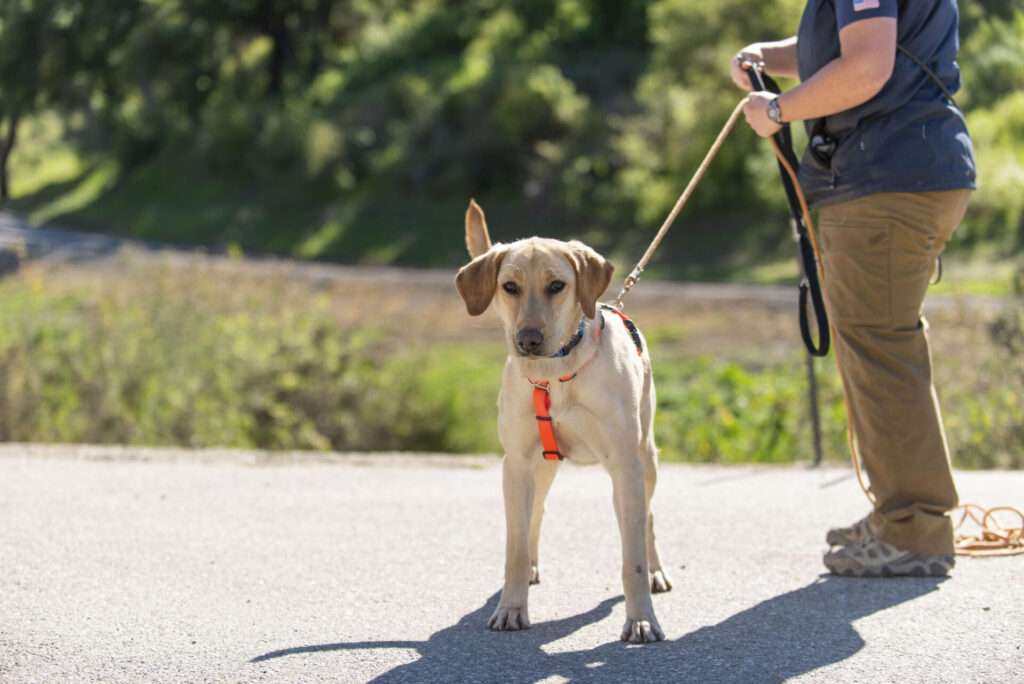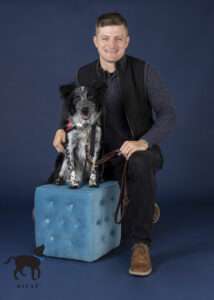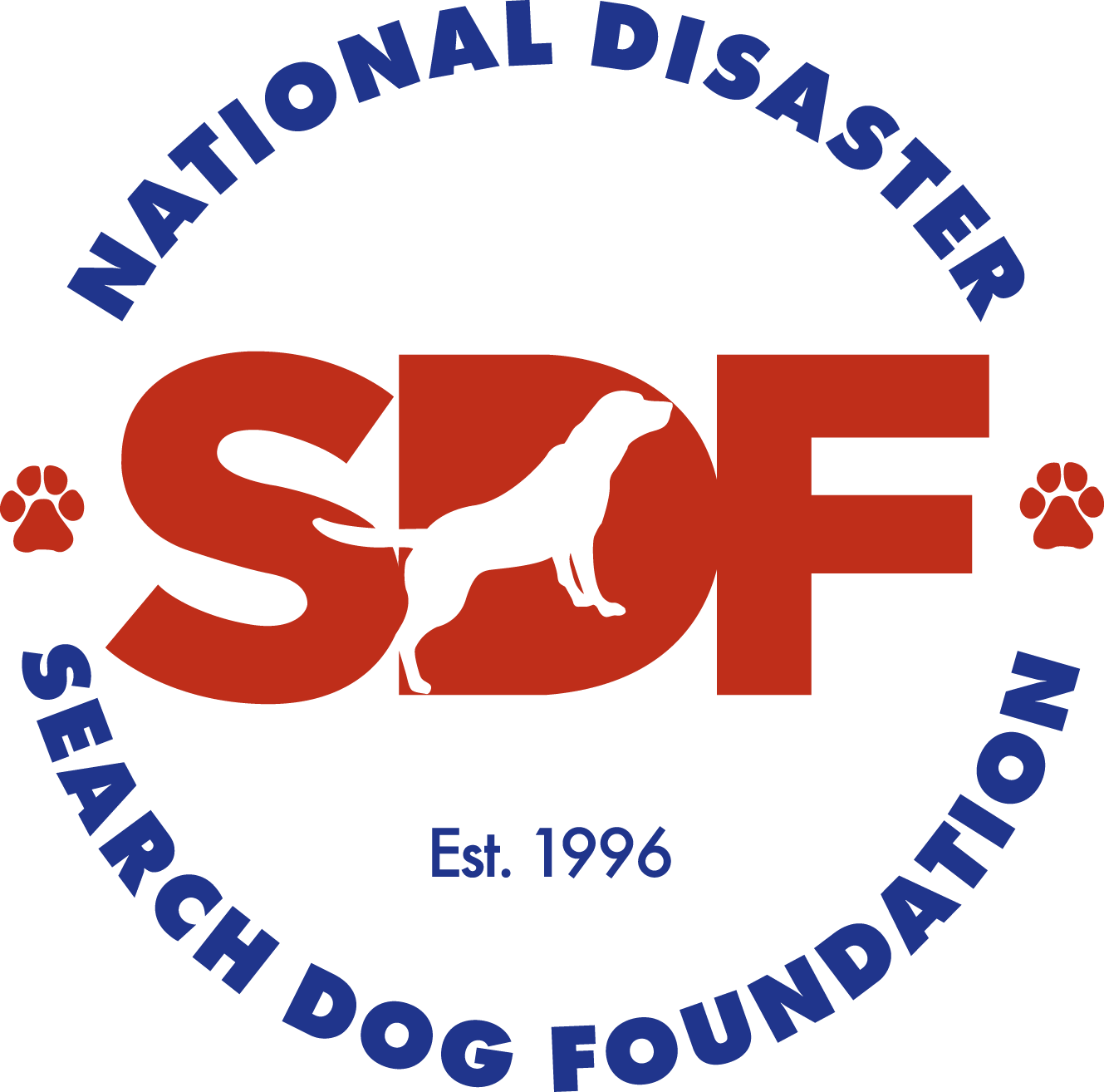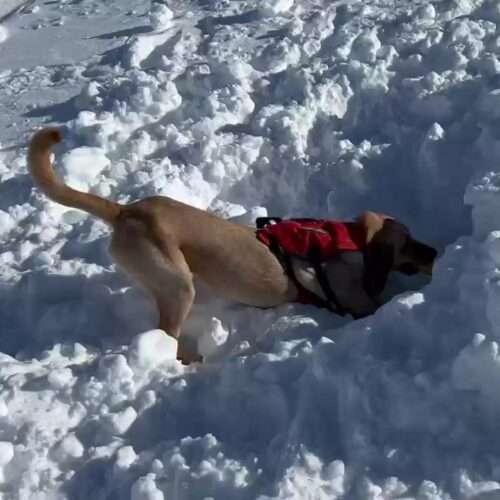
When we recruit canine candidates for our search program, we look for attributes such as high energy, toy obsession, friendliness, and confidence, which can indicate search and rescue might be their ideal career path. But not every dog who demonstrates an aptitude for search work ends up loving it. Like humans, dogs have the ability to do many things, but that doesn’t mean they’re passionate about all of them.
That’s why, if through the course of their training one of our search candidates makes it clear disaster search isn’t for them, we respect their choice. Through our Lifetime Care program, we promise each dog we recruit the chance at the life that makes them happiest. If that’s in a pet home, we look for a family who will meet their physical and emotional needs. If it’s a new job, we look carefully at the dog’s individual preferences to help them find a fulfilling career in line with their passions.
Treating each dog not just as an individual but as an individual with agency is relatively uncommon, but the philosophy is gaining traction. In her May 18, 2022 article in Psychology Today, Bioethicist Jessica Pierce, Ph.D., writes, “Dogs have very little control over their sensory environment, their social interactions, and the basic elements of daily survival, all of which are orchestrated by human guardians. This lack of control—a near-total loss of agency—has significant fallout for their physical and especially their psychological well-being.” Dogs already have minimal say in almost every aspect of their lives. We believe forcing them to perform an unrewarding or psychologically uncomfortable job should not be added to the list.
Why might a working dog not want to pursue search and rescue as a career? One of the most common reasons is an aversion to the rubble, which we classify as “tactile concerns.” When a dog transitions from searching flat ground to searching a rubble pile, they might not like the feel of the unstable or uneven surfaces under their feet.
 Such was the case with search candidate Lady, whose abundant, untapped energy inspired her to turn her owner’s living room furniture into a room full of chew toys. After an SDF recruiter discovered her working dog potential, Lady began training at SDF but soon made it clear that a job traversing rubble wasn’t for her. Through our network of working dog contacts, we found Lady a job that suits her much better—although she disliked navigating debris, she loves dashing through the snow, and now spends her days on the ski slopes of Utah as a member of the Powder Mountain avalanche rescue team.
Such was the case with search candidate Lady, whose abundant, untapped energy inspired her to turn her owner’s living room furniture into a room full of chew toys. After an SDF recruiter discovered her working dog potential, Lady began training at SDF but soon made it clear that a job traversing rubble wasn’t for her. Through our network of working dog contacts, we found Lady a job that suits her much better—although she disliked navigating debris, she loves dashing through the snow, and now spends her days on the ski slopes of Utah as a member of the Powder Mountain avalanche rescue team.
Other common issues that can trigger a career change for search candidates are “environmental sensitivity” and “lack of focus.” Both relate to the dog’s level of commitment to the search scenario, whether they’re distracted by small animals or sounds in the search area, or not motivated enough by the search game to stick with it.
 Former search candidate Ryan’s hyper-awareness of his environment prevented him from moving on with the search program, so our Lifetime Care coordinator found him a spot with First Responder Canine, which trains dogs to become assistant companions to first responders who have incurred life-changing injuries while serving in their jobs. Service dog work turned out to be a winner for Ryan, and he’s currently loving his life as a canine companion providing support to a former police officer with PTSD.
Former search candidate Ryan’s hyper-awareness of his environment prevented him from moving on with the search program, so our Lifetime Care coordinator found him a spot with First Responder Canine, which trains dogs to become assistant companions to first responders who have incurred life-changing injuries while serving in their jobs. Service dog work turned out to be a winner for Ryan, and he’s currently loving his life as a canine companion providing support to a former police officer with PTSD.
Sometimes the thing preventing a candidate from progressing in the search program is simply their personality. A dog might do well in all of their search elements but prefer the company of some dogs over others, or they may require slow introductions to new dogs. Search dogs must be friendly or neutral to new dogs since they often travel with or work with other canine teams. So, if a candidate’s dog selectivity can’t be conquered by increased socialization and training, a career in search won’t work for them, but that doesn’t mean they can’t be successful at other detection work. Jobs in conservation detection often utilize just one canine and handler or a very small team, limiting exposure to unfamiliar dogs. We’ve had several former search candidates change careers to conservation detection, working on projects from bat conservation in the California desert to sniffing out invasive plants in the Pacific Northwest.
 As we gain more insight into how dogs think and feel, we can be better advocates when seeking a placement that suits their needs. At the same time, fields that utilize canine expertise are expanding. Dogs can be trained to find just about anything. Human survivors in rubble and snow—sure—but they can also detect bedbugs, endangered and invasive species of plants and animals, electronics components, imminent seizures, diabetes, cancer, and in just the last few years, COVID.
As we gain more insight into how dogs think and feel, we can be better advocates when seeking a placement that suits their needs. At the same time, fields that utilize canine expertise are expanding. Dogs can be trained to find just about anything. Human survivors in rubble and snow—sure—but they can also detect bedbugs, endangered and invasive species of plants and animals, electronics components, imminent seizures, diabetes, cancer, and in just the last few years, COVID.
That’s why we’ve evolved our programs to broaden the opportunities for our canine candidates. When we evaluate high-drive shelter dogs, it’s with an eye toward training them for search knowing we can find meaningful work they like better if search and rescue doesn’t work out. By doing our utmost to grant each dog in our SDF family their choice of a satisfying job, our Lifetime Care program ensures they have the best chance at the happy life they deserve.

